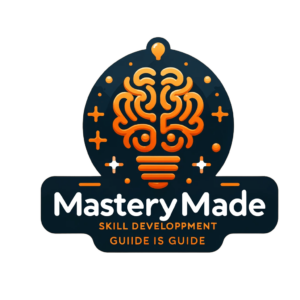We understand that navigating the ever-evolving job market can be both thrilling and daunting. Knowing where to focus energy and resources is pivotal for securing that dream role or next big promotion. With our insights backed by the Bureau of Labor Statistics for the latest career trends, insights from Harvard Business Review on professional growth, and success strategies from Forbes, we’re here to equip you with actionable career advancement strategies, successful career progression advice, and career development tips that really work.
Our expansive guide is designed to carve out a path for our readers through the competitive landscape towards achieving their professional milestones. By being proactive and employing the strategies we share, you can set the stage for a flourishing career that not only meets but exceeds your aspirations. Let’s embark on this journey of career enhancement together, embracing growth and steering towards a future bright with possibilities.
Key Takeaways
- Adopting a proactive approach is key to successful career progression.
- Understanding current trends and data can inform effective career development decisions.
- Utilizing a strategic mix of growth tactics can elevate your professional trajectory.
- Personal and professional growth go hand-in-hand for career advancement.
- Success in today’s job market requires resilience, adaptability, and a constant learning mindset.
Understanding the Fundamentals of Career Progression
The journey of career enhancement is as unique as the professionals embarking on it. To navigate this path effectively, one must embrace personalized career progression strategies. Grasping these fundamentals isn’t just about moving up the ladder; it’s also about cultivating a richer understanding of one’s own ambitions and the various landscapes of opportunity. Let’s explore the essence of career growth and how it can be tailored to individual aspirations.
Defining What Career Advancement Means to You
Before one can chart a course for career advancement, it’s critical to define what success looks like on a personal level. Is it leadership, expertise, or work-life integration? Or perhaps it’s the pursuit of meaningful work that drives innovation and change. This definition serves as a beacon for all subsequent career advancement techniques and decisions.
Setting Realistic and Achievable Goals
Equipped with a clear definition of career advancement, setting goals is the next pivotal step. The LinkedIn Workplace Learning Report extols the virtue of SMART goals—those which are Specific, Measurable, Achievable, Relevant, and Time-bound—all key components that we endorse in crafting a robust plan for career progression.
Recognizing Your Current Position and Opportunities
Understanding your current standing within your chosen field is an enlightening exercise. It’s essential to recognize not only your strengths and areas for development but also the opportunities that exist around you. The Society for Human Resource Management and platforms like Glassdoor provide valuable insights that can guide individuals in identifying potential career pathways and their requisite strategies.
| Development Areas | Opportunities for Growth | Actionable Strategies |
|---|---|---|
| Leadership Skills | Mentorship Programs | Seek leadership training and mentor guidance |
| Technical Expertise | Online Courses & Certifications | Enroll in courses relevant to industry trends |
| Networking | Professional Associations | Attend industry events and connect online |
| Innovation | Research & Development Projects | Contribute to projects and propose new ideas |
As we continue to share tips for career growth, remember that these principles are the bedrock on which you can build a fulfilling and dynamic career. Career progression is a path marked by continuous learning and adaptation, and with the right mindset and methodology, it can take you to heights previously unimagined.
Developing a Robust Professional Network
In our quest for professional network growth, we recognize that the relationships we foster are instrumental in paving the ways to advance our career. It’s not just about who you know, but also about who knows you and the value you bring to the table. Whether it’s through face-to-face conferences or leveraging LinkedIn for career advancement, the significance of networking spans across all sectors.
The Importance of Networking in Various Industries
From the tech start-ups of Silicon Valley to the financial hubs of New York, every industry thrives on the power of connectivity. In disciplines where innovation is rapid and competition is fierce, being part of a professional network can mean the difference between obscurity and recognition. Networking isn’t just socializing; it’s about creating strategic alliances where knowledge, skills, and opportunities can be exchanged.
Building Relationships with Mentors and Peers
One of the primary steps in nurturing a professional network is establishing relationships with mentors who can provide guidance, and with peers who can offer support and collaboration. Such relationships can be a treasure trove of advice, referrals, and a conduit to new opportunities. We cannot emphasize enough the long-term benefits of having a mentor who can be both a sounding board and a beacon throughout our career journey.
Leveraging LinkedIn and Other Professional Platforms
LinkedIn, the colossus of professional networking sites, offers unparalleled features for career advancement. Its reach is vast, and the potential for engaging with like-minded professionals is immense. Below, we provide you with a table that presents the top benefits of using LinkedIn for networking, demonstrating how this platform can serve as a cornerstone for career development:
| Feature | Benefit | Best Practice |
|---|---|---|
| LinkedIn Groups | Join industry-specific groups to gain insider knowledge and participate in discussions. | Actively contribute to conversations to establish your expertise. |
| Personalized Connection Requests | Create meaningful connections by tailoring your requests with a personal touch. | Always include a personalized message stating your reason for connecting. |
| LinkedIn Learning | Enhance your knowledge and skills through targeted online courses. | Complete courses relevant to your industry and add certifications to your profile. |
| Recommendations and Endorsements | Boost your credibility by having your skills endorsed and collecting recommendations from colleagues. | Request recommendations from those you have worked with directly, and endorse others generously. |
The strategic use of these features not only enriches your professional profile but also signals to potential employers and collaborators that you are committed to professional network growth and career advancement. Embrace these tools and platforms, and make them work for your future success.
Enhancing Your Skillset with Continued Education and Training
As we navigate the dynamic landscape of the professional world, continued education has become a cornerstone for those seeking to accelerate their careers. It’s clear that a commitment to learning and self-improvement opens a myriad of career advancement opportunities. Therefore, identifying the right training for career progression can be a transformative step in our professional lives.
Skills Gap Analysis: The Starting Point
Recognizing where our skillsets fall short is the prelude to growth. Industry experts advocate for a deliberate analysis to pinpoint areas for development. Once identified, we can pursue targeted educational programs that not merely fill those gaps but propel us to the forefront of our field.
“Education is the most powerful weapon which you can use to change the world.” – Nelson Mandela
Continued Education Platforms and Their Impact
Several platforms stand out when it comes to professional growth, including Coursera, LinkedIn Learning, and Udemy. These platforms offer courses that cater to a vast array of industries and deliver tangible benefits to those looking to advance.
- Coursera partners with universities to offer courses and specializations that can lead to certifications or even degrees.
- LinkedIn Learning highlights courses that enhance your profile’s appeal, directly linking learning to career opportunities.
- Udemy boasts a large volume of courses with a focus on specific skills, often created by industry professionals.
| Platform | Features | Industry Relevance |
|---|---|---|
| Coursera | University partnerships, certifications, degrees | Highly diverse, cross-industry appeal |
| LinkedIn Learning | Skills enhancement, profile integration | Business, technology, creative |
| Udemy | Volume of courses, industry professional instructors | Wide-ranging, from IT to design |
From the depths of coder bootcamps to the expanses of executive leadership seminars, continued education is pivotal. These modes of learning are shaping the very fabric of our professional journey, unlocking levels of expertise once thought unattainable. We bear witness to countless testimonials from professionals who, through the power of education, have sculpted their career paths to new heights.
In light of these insights from the U.S. Department of Education and career experts, we must lean into the possibilities that education affords us. It is an unrivaled instrument in our arsenal for personal development and professional ascendancy.
Remember, the pursuit of knowledge is never a solitary endeavor. It’s a shared journey that echoes through the courses we take, the certifications we earn, and the networks we cultivate. Together, let’s embrace the challenge, seize the training for career progression, and unlock the door to the future we envision for ourselves.
Career Advancement Tips to Elevate Your Professional Presence
In today’s competitive job market, establishing a strong professional presence is more crucial than ever. It’s not just about what you know, but also how you communicate your expertise and value. Let’s explore some key strategies to enhance your professional image and accelerate your career growth.

Mastering the Art of Self-Promotion
Self-promotion is a delicate balance between showcasing your achievements and maintaining humility. When done correctly, it can significantly boost your professional presence. Here are some self-promotion techniques that can help:
- Create a compelling elevator pitch that succinctly highlights your unique value proposition.
- Contribute thought-leadership articles to industry publications to showcase your expertise.
- Seek speaking opportunities at conferences to gain visibility and establish credibility.
Effective Communication and Personal Branding
Your ability to communicate effectively is an essential component of your personal branding. Here’s how you can use communication to bolster your personal branding for career growth:
- Build a professional online presence with a consistent message across all platforms.
- Engage with your network by sharing insightful content and participating in discussions.
- Monitor and actively manage your online reputation to align with your desired brand image.
“Your brand is what people say about you when you’re not in the room.” – Jeff Bezos, Amazon founder.
Using Performance Reviews to Your Advantage
Transform performance reviews from a passive experience into a proactive tool. Take the feedback you receive and turn it into an actionable plan to enhance your professional presence. This could include:
- Setting specific, measurable, and time-bound goals to improve or develop new skills.
- Reviewing your accomplishments regularly and updating your CV and LinkedIn profile to reflect your growth.
- Asking for projects that align with your career objectives to demonstrate your commitment and capability.
In implementing these strategies, you will not only refine your professional presence but also open doors to new career advancement opportunities. Your personal brand, adept self-promotion, and thoughtful engagement with feedback can set you apart in a bustling career landscape. Let’s embody these actions and watch as our professional journeys evolve into stories of success and influence.
Strategic Positioning for Promotions and Leadership Roles
As we navigate our careers, the aspirations we chase often revolve around climbing the corporate ladder, acquiring leadership roles, and positioning ourselves for promotions. To steer your career trajectory toward these elevations, we’re delving into the essentials of career advancement advice that have empowered many to break through the glass ceiling. It’s not merely about being good at what you do; it’s also about being smart about how you display your value and potential to key decision-makers.
Positioning for promotions is an art that intertwines diverse skills and timing. You ought to be seen as someone who takes initiative and leads even before you’re asked to do so. Illustrating your potential in real-time scenarios makes a compelling statement about your readiness for the next big leap. Turn every project into an opportunity to exhibit your talent and problem-solving abilities. It’s about creating a narrative where your growth is seen as integral to the organization’s success.
Below is a table that outlines the critical aspects that can help in positioning oneself for upward movement in one’s career, based on insights from industry experts and statistics from career development consultants:
| Aspect | Description | Impact |
|---|---|---|
| Initiative | Proactively tackling projects and opportunities without awaiting directions. | Signals readiness for responsibility, driving the perception of leadership potential. |
| Visibility | Ensuring your contributions get recognized within and beyond your immediate department. | Amplifies the perception of your value to the company and sets the stage for promotion. |
| Continuous Learning | Seeking knowledge and skills relevant to the evolving demands of your industry. | Illustrates adaptability and positions you as a lifelong learner and a valuable asset. |
| Mentorship | Engaging with mentors to gain insights and advice for professional development. | Facilitates connections and understanding of nuanced corporate dynamics for strategic advancement. |
Fortified with these insights, it is essential to align your efforts with the organization’s trajectory. A promotion or transition into a leadership role often stems from not just excelling in your current functions, but also from displaying abilities that align with future needs and challenges the company faces. Reflect on how you can morph into a catalyst for innovation and influence within your team or department.
Our advice to you, drawn from testimonies and breakthroughs, distills into this: remain sentient of the needs around you and ready to evolve. Blinkers off, and eyes on the long-term goals. The art of positioning oneself is less about formidable leaps and more about consistent, nuanced advancements that collectively compound into an undeniable case for your ascent.
Work-Life Balance and Its Impact on Career Growth
As we delve into the foundation of career success, it’s critical to acknowledge the role of work-life balance. Finding equilibrium between the demands of our professional lives and our personal well-being is not just a luxury—it’s a strategic necessity. Embracing this balance can drive us towards greater job satisfaction, improved mental health, and ultimately, sustained career growth.

Understanding the Synergy Between Personal and Professional Life
The fusion of our personal and professional lives can create a synergy that propels us forward. Recognizing that these aspects are not mutually exclusive but rather complementary is the first step. This understanding can lead to improved stress management, heightened productivity, and an enhanced sense of purpose both in and out of the workplace.
Time Management Strategies for Productivity
To harness the power of time management strategies, we must prioritize our tasks and set clear boundaries. This might involve creating to-do lists, allocating specific times for work and rest, and learning to say ‘no’ when necessary. Effective time management empowers us to accomplish more while also affording us the time to rejuvenate and engage in activities that bring us joy.
Stress Management Techniques to Maintain Performance
In the pursuit of career success, managing stress is not something we can afford to overlook. Stress can be a huge barrier, which, if not managed effectively, can limit our potential. By incorporating stress reduction techniques such as mindfulness, exercise, and adequate rest into our routines, we’re not just improving our health—we’re investing in our career longevity.
Employing Creative Thinking for Problem Solving and Innovation
As we navigate the complex landscape of professional development, it’s evident that creative thinking and innovation are foundational pillars of success. These competencies not only spark fostering innovation for professional growth but are also instrumental in problem-solving in career advancement. We believe that by honing these skills, individuals can significantly enhance their marketability and contribute to a more vibrant, dynamic workplace.
Fostering a Culture of Continuous Improvement
Continuous improvement is not just a buzzword; it’s a vital approach that can be infused into every aspect of one’s career. By creating an environment that celebrates experimentation and learning from failure, we set the stage for breakthroughs and efficiencies that keep our professions and industries advancing.
Encouraging Creativity to Stand Out in Your Field
Standing out in a saturated job market requires more than meeting the status quo. It requires a commitment to creative thinking that can differentiate you from the competition. It’s the unconventional ideas and the willingness to challenge norms that often lead to new opportunities and advancements in one’s career.
Adapting to Change and Embracing New Challenges
In a world that continually changes, adaptability is non-negotiable. The professionals who thrive are those quick to embrace new challenges, pivot in the face of disruption, and see change as a pathway to innovate and grow. This elasticity is key to fostering innovation for professional growth and staying relevant in your chosen field.
Conclusion
We’ve navigated through a rich tapestry of strategies designed to catalyze your career trajectory. Each chapter aimed to shine a light on essential aspects of professional empowerment, from forging robust networks to embracing continuous education and creative thinking. By integrating these steps to advance in your career, we encapsulate a vision for success that is both attainable and self-directed.
As you reflect on this journey, remember that career advancement advice is only as effective as its application. Our goal is to kindle a fire within you, prompting you to tailor these guidelines to fit your unique path. It’s the personal touch you infuse into these practices that will distinguish your ascent in the professional realm. Embrace the challenge, for it is within these moments that significant growth occurs.
In closing, we urge you to foster a mindset entrenched in the principles of professional growth advice that we’ve shared. Let adaptability and a hunger for learning be the cornerstones of your enduring development. Allow the cumulative wisdom of our discourse to be your compass as you steer towards the horizon of your career aspirations. We are confident that with persistence, insight, and the right approach, the forthcoming chapters of your career story will be marked by rewarding milestones and admirable achievements.
FAQ
What does career advancement entail and why is it important?
Career advancement is the process of making progress within your professional field, which often involves gaining higher-level positions, increasing responsibility, and obtaining better compensation. It’s important because it can lead to personal fulfillment, financial stability, and the opportunity to achieve one’s career goals. Proactive career development is crucial in today’s job market to ensure long-term success and satisfaction.
How can I define what career advancement means for me personally?
Defining career advancement for yourself involves identifying your own professional goals, values, and what success looks like in your industry. Take the time to reflect on what you want from your career both in the short-term and long-term, and let those insights guide your advancement strategies.
Why is setting goals important for career progression?
Setting goals provides direction and benchmarks for your career. Goals help you to focus your efforts on what’s important, measure your progress, and stay motivated. They should be realistic and achievable, tailored to your ambitions and abilities, with clear steps on how to achieve them.
How can I assess my current career position and identify opportunities for advancement?
Assessing your current position involves evaluating your job responsibilities, performance, and satisfaction levels. Identify opportunities by staying informed about industry trends, seeking feedback, and networking. Look for potential career moves within or outside your current organization that align with your goals.
How critical is networking for career advancement?
Networking is vital for career advancement as it opens doors to new opportunities, provides valuable insights, and can help in building a support system. Whether it’s through industry events, professional associations, or platforms like LinkedIn, networking can significantly impact your career trajectory.
What role do mentors play in career progression?
Mentors can play a key role by offering guidance, advice, and support. They can provide industry insights, help you navigate challenges, and may open doors to opportunities through their own networks. Building strong relationships with mentors can enrich your professional development.
What strategies are effective for personal branding and self-promotion?
Effective strategies for personal branding and self-promotion include developing a clear message about who you are professionally, consistently showcasing your achievements, and contributing value to your industry through thought leadership. Engaging on professional platforms and networking events can also enhance your visibility.
How can continued education and training contribute to career advancement?
Continued education and training keep your skills current and relevant, positioning you as a valuable asset to employers. They can fill gaps in your knowledge, help you keep up with industry changes, and may qualify you for more advanced roles within your field.
How can I use performance reviews to advance my career?
Performance reviews offer a chance for self-assessment and receiving constructive feedback. Utilize them to set new goals, identify areas for development, and discuss career aspirations with your supervisor. Use the feedback to improve performance and show readiness for advancement.
What’s the importance of work-life balance in achieving career growth?
A healthy work-life balance can improve job satisfaction, prevent burnout, and maintain high performance. Managing time effectively and mastering stress management techniques help you remain productive, which can be conducive to career advancement.
How does strategic positioning help in gaining promotions or leadership roles?
Strategic positioning involves demonstrating your value, taking initiative, and cultivating the skills necessary for higher-level roles. By consistently delivering results and showcasing leadership qualities, you make yourself a more compelling candidate for promotions and leadership opportunities.
In what ways does creativity contribute to career progression?
Creativity can lead to innovative problem solving, process improvements, and new ideas that can benefit your organization. By fostering a creative mindset, you can differentiate yourself in your field and demonstrate your potential for leadership and advanced roles.











